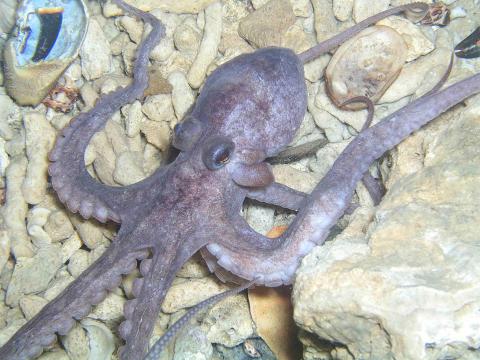A species of octopus native to the waters north of Penghu County is on the brink of extinction, county officials said yesterday.
The octopus normally lives off the coast of Yuanbei Village (員貝) and near Jibei Village (吉貝) between the months of February and May, but over the past few years it has rarely been seen, Yuanbei Warden Chen Tien-jui (陳天瑞) said.
Chen believes the octopus’ declining population is due to changes in the ecosystem.

Photo courtesy of the Agriculture and Fisheries Bureau of Penghu County Government
Normally the octopus lays its eggs in the intertidal zone in the northern part of the county between the Lantern Festival and Tomb Sweeping Day.
Aside from Yuanbei and Jibei, the octopus was normally found near Citou Wharf (岐頭碼頭) and Jhongtun Village (中屯) in the county’s Baisha Township (白沙), as well as in Magong City’s Chongguang Borough (重光), Chen said.
The intertidal zone near Yuanbei has been largely filled with sand and stones, making the area suitable for some species while others have been eliminated, he said, adding that mantis shrimp and eels have also begun to disappear from the area.
The main reason is that the caverns and boulders that the marine animals would use to hide in have been buried, he said, adding that octopus species that like shallow waters are also losing places to nest in.
Hsieh Yung-liang (謝永亮), who collects satellite photographs of the county, said that the changes to the coastline over the past seven years are strikingly evident.
A photograph from 2011 shows blue water around the coastline, while one of the same coast from 2017 shows a coastline that is white from the shells, sand and gravel that have raised the seafloor, he said.
Another effect of a rising seafloor is a loss of coral, Hsieh said, adding that aside from the coral itself, the marine life it houses is being pushed out.
If the situation is not addressed soon, some indigenous marine life, including the small octopus native to the county, is likely to become extinct within 10 years, he said.
Merely prohibiting the fishing of the octopus would not save it from extinction, he added.

Chinese Nationalist Party (KMT) Chairman Eric Chu (朱立倫), spokeswoman Yang Chih-yu (楊智伃) and Legislator Hsieh Lung-chieh (謝龍介) would be summoned by police for questioning for leading an illegal assembly on Thursday evening last week, Minister of the Interior Liu Shyh-fang (劉世芳) said today. The three KMT officials led an assembly outside the Taipei City Prosecutors’ Office, a restricted area where public assembly is not allowed, protesting the questioning of several KMT staff and searches of KMT headquarters and offices in a recall petition forgery case. Chu, Yang and Hsieh are all suspected of contravening the Assembly and Parade Act (集會遊行法) by holding

PRAISE: Japanese visitor Takashi Kubota said the Taiwanese temple architecture images showcased in the AI Art Gallery were the most impressive displays he saw Taiwan does not have an official pavilion at the World Expo in Osaka, Japan, because of its diplomatic predicament, but the government-backed Tech World pavilion is drawing interest with its unique recreations of works by Taiwanese artists. The pavilion features an artificial intelligence (AI)-based art gallery showcasing works of famous Taiwanese artists from the Japanese colonial period using innovative technologies. Among its main simulated displays are Eastern gouache paintings by Chen Chin (陳進), Lin Yu-shan (林玉山) and Kuo Hsueh-hu (郭雪湖), who were the three young Taiwanese painters selected for the East Asian Painting exhibition in 1927. Gouache is a water-based

Taiwan would welcome the return of Honduras as a diplomatic ally if its next president decides to make such a move, Minister of Foreign Affairs Lin Chia-lung (林佳龍) said yesterday. “Of course, we would welcome Honduras if they want to restore diplomatic ties with Taiwan after their elections,” Lin said at a meeting of the legislature’s Foreign Affairs and National Defense Committee, when asked to comment on statements made by two of the three Honduran presidential candidates during the presidential campaign in the Central American country. Taiwan is paying close attention to the region as a whole in the wake of a

OFF-TARGET: More than 30,000 participants were expected to take part in the Games next month, but only 6,550 foreign and 19,400 Taiwanese athletes have registered Taipei city councilors yesterday blasted the organizers of next month’s World Masters Games over sudden timetable and venue changes, which they said have caused thousands of participants to back out of the international sporting event, among other organizational issues. They also cited visa delays and political interference by China as reasons many foreign athletes are requesting refunds for the event, to be held from May 17 to 30. Jointly organized by the Taipei and New Taipei City governments, the games have been rocked by numerous controversies since preparations began in 2020. Taipei City Councilor Lin Yen-feng (林延鳳) said yesterday that new measures by